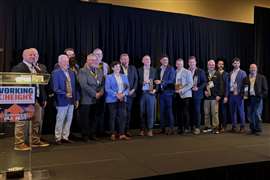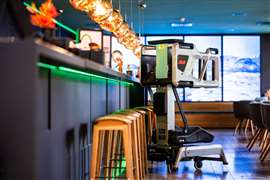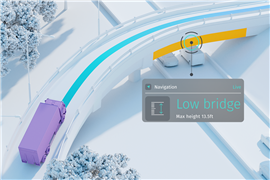Read this article in Français Deutsch Italiano Português Español
Middle East access market sees growth amid conflict
22 March 2024
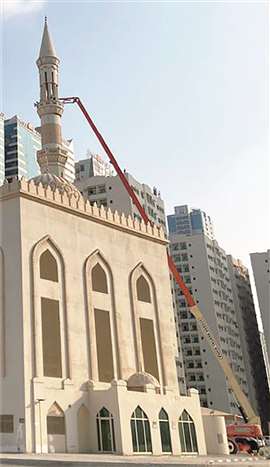 A JLG 1350SJPS belonging to ALG in Dubai.
A JLG 1350SJPS belonging to ALG in Dubai.
Apart from variances in the access rental markets across the Middle East, the political situation in the region is certainly complex, with, for example, the conflict in Gaza and disruption in the Red Sea by the Houthi rebels providing two examples.
Yet the fast growth of the MEWP and rental market in much of the region is a positive one, with major safety-conscious projects and healthy competition spurring rapid development. Nevertheless, Access Rental Gulf (ARG), which provides its services across the GCC, including UAE, Saudi Arabia, Qatar and Bahrain, points out that you need to be nimble in this diverse region, where situations can change overnight.
On the topic of political dynamics, Nick Selley, group business development director of ARG’s parent company AFI Rentals, says, “To date we have seen no discernible impact. However, as a responsible business we need to balance risk and reward, as things can change quickly and as a business we need to be able to react quickly.”
For example, says Selley, at the beginning of 2023 the UAE moved its working week from Sunday - Thursday, to Monday - Friday.
As Selley adds, “Things can change and change quickly. I understand that Bahrain is also considering moving to a Monday to Friday working week.”
Some of the regulation changes are a result of the fast-developing nature of the markets, which led to the Kingdom of Saudi Arabia (KSA) revising its machinery approval regulations in 2023, which means all invoices must now have a government approved QR code.
Another consideration is the varying regulations between nations in the region. “Unlike Europe the Middle East has hard borders,” says Selley, “To move equipment between territories with the different rules and procedures is challenging.”
Nevertheless, the potential in the region is great, although, adds Selley, the dynamics have changed. KSA has become the key growth market in the region, overtaking the likes of the UAE, thanks to new Mega projects, which according to the latest Middle East Business Intelligence (MEED) report, published in October 2023, have a combined value of nearly $900 billion.
Those new construction and infrastructure projects in KSA include NEOM and Vision 2030 pro, which are in turn complemented by airports, roads and utilities, which require MEWPs for installation, maintenance and inspection.
By contrast, the UAE market has gone through a more challenging period, although, according to MEED, there are signs that the construction market is improving.
Overall, the rental sector has matured in the GCC nations, but, adds Selley, “There remains significant scope for future development in the repair, maintenance and improvements (RMI) and facility management (FM) sectors, but construction, infrastructure and oil & gas remain key.”
Safety regulations are also becoming increasingly important, with IPAF taking the lead in the region. As Selley points out, “One area I would cite is the continued growth of IPAF training across the GGC, especially in the UAE.”
In the UAE there is a requirement to conduct training every two years, and, Selley adds, KSA is pushing towards that.
Further to this, the region is also being quick to adopt digital technology. Selley believes that around 24% of IPAF PAL cards issued in the region are now digital.
On the subject of new manufacturers appearing on the scene, Selley says,”Both Sinoboom and Zoomlion have both established operations in the region.”
Widening options
Diving deeper into brand choice, regional renter Rapid Access, part of the Loxam group, has the view that rental companies and end users are increasingly keen on established brands like JLG, Genie, and Dingli.
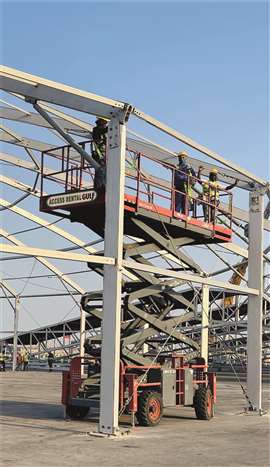 ARG’s Skyjack SJ9250 at Sheikh Nasser bin Hamid Al Kalifa’s stables.
ARG’s Skyjack SJ9250 at Sheikh Nasser bin Hamid Al Kalifa’s stables.
Rapid has a longstanding presence in the Middle East with 12 depots in KSA, UAE, Qatar, Oman and Kuwait. In addition, the company operates satellite depots offering equipment repair, maintenance, service and safety training.
It also highlights KSA as a rapid growth market, with oil & gas generating a particular demand for MEWPs that are robust and capable of withstanding the demanding environments typical of energy sector projects.
In contrast, markets such as Oman and Bahrain, which are decidedly less mature markets, prioritise versatility and compactness when it comes to equipment choice, catering to the needs of smaller-scale construction activities and maintenance operations.
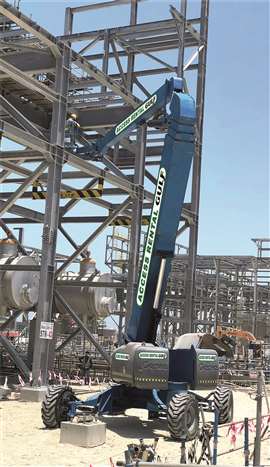 An ARG Genie Z135 working at BAPCO’ Bahrain Petroleum refinery.
An ARG Genie Z135 working at BAPCO’ Bahrain Petroleum refinery.
This means Rapid’s equipment portfolio needs to be diverse. In addition, Rapid provides upgraded equipment in working environments such as aviation and defence.
The fact that there is a growing demand for electric and hybrid models to reduce carbon footprint demonstrates the pace at which countries like KSA are moving into maturity. Additionally, integrating telematics and digital platforms for fleet management is becoming more prevalent.
That said, rental market maturity varies widely across the Middle East. The UAE, Qatar and Saudi Arabia are relatively mature, says Waleed Isaac, Rapid Access Managing Director for the Middle East and International, with a strong emphasis on safety regulations and a growing preference for rental over ownership. “Other markets are still developing, with opportunities to educate and promote rental benefits.”
Isaac adds, “It is worth noting that rental maturity tends to be sector-specific in the Middle East with oil & gas and aviation leading the pack.”
Echoing thoughts already highlighted, Isaac explains that the main challenges in the region include supervising the diverse regulations and the logistical difficulties of operating across borders.
“However, the growth potential is immense, especially with the ongoing construction boom, infrastructure investment and increasing workplace safety awareness.”
Asaac adds, “As large industrial and construction projects are undertaken in tight delivery schedules aerial platforms are quickly becoming a necessity for improved project turnaround times.”
Heavy rotation
A key challenge, adds Isaac, is catering for operator-training and equipment familiarisation as clients rotate a large number of operators across their projects.
The more mature markets are expected to adhere to stringent safety standards and best practice.
“In other, less mature markets within the region, substantial potential exists to educate and advocate for the advantages of equipment rental…safety features and compliance with international safety standards.”
Additionally, deepening political turmoil across the region is playing a role in the industry’s growth. “We see consistent investment and project development in stable environments, driving demand for our machines,” says Isaac.
“Conversely, political uncertainties can lead to market volatility, affecting long-term planning and investments.”
Based in the fast-maturing KSA is Dayim Equipment Rentals, a major generalist rental company with a solid specialisation in MEWPs, inclusding sales as the sole dealer for Manitou products in KSA and Qatar.
The company boasts the youngest fleet in the KSA, it says, with an average of four years.
Dayim is also the only Saudi rental company to have IPAF and IADC accreditation with TVTC (Technical and Vocational Training Corporation) approval.
As well as KSA, the company has rental branches in Bahrain, Kuwait, Qatar and Dubai, with an upcoming base in Oman. Its expansion plans include Iraq and India, “in the very near future”, says Shaikha Ben Mahfoudh, Dayim’s Regional Business Development Manager. “We are watching these markets very closely.”
One thing for sure, the ability to adapt to the unique conditions is vital. The climate in the GCC is characterized by extreme heat and occasional sandstorms, which poses challenges for the durability of equipment. Regular maintenance and robust design are essential to withstand these conditions.
The mega construction projects in the KSA, combined with the oil & gas sector in the GCC region and the increasing emphasis on safety and efficiency in the workplace, ensure the use
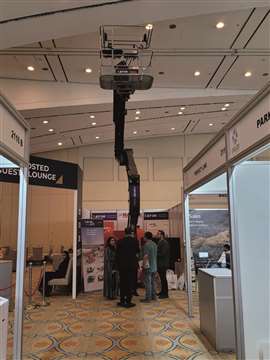 Dayim Equipment Rentals at an aviation industry exhibition.
Dayim Equipment Rentals at an aviation industry exhibition.
of aerial platforms are being recognised, says Mahfoudh.
As a result, there is a great deal of interest from OEMs and the growing rental sector. “The rental market has become highly competitive, with multiple companies vying for market share.”
Rather than this competition driving rental rates down to unfeasibly low levels, as is the case in other new rental markets, the competition has led to improved service quality, competitive pricing and increased availability of equipment.
Mahfoudh comments, “The presence of well-established rental infrastructure, including rental depots, maintenance facilities, and transportation logistics, demonstrates the maturity of the market. These infrastructure investments enable efficient rental operations and timely equipment delivery.
“Customers in the Middle East are now more aware of the advantages of renting aerial platforms instead of purchasing them outright.”
The increasing sophistication of the arial platform sector also means rental companies in the region now offer a wide range of product types, including scissors, boom lifts and vertical lifts, although they are predominantly boom led.
While that shift has some way to go, adds Mahfoudh. “Within the areas where we operate, we are still seeing a predominance of booms over scissors but that is slowly changing on some projects.”
In the past the main players in the market have traditionally invested in Genie, JLG and Haulette, Mahfoudh continues, “but in recent years we have seen a lot more brands coming into the market.”
“It is becoming a lot more competitive and we are now seeing more diversity and a bigger presence from Manitou, Dingli, Sinoboom, JCB and Zoomlion.
Mahfoudh continues, “It’s important to note that there are other reputable brands available in the GCC market as well.
“Rental companies and end users often choose equipment brands that align with their operational needs, reliability expectations, and budget considerations.
Views from OEM: Dingli looks at UAEDingli has been growing its interests in the Middle East to include a range of depots. Peter Ellis, Dingli’s general manager for the Middle East, including the Cooperation Council for the Arab States of the Gulf (GCC) region and North Africa, took on the role at Dingli in November 2021. Having originally worked in rental in the UK, Ellis has a keen understanding of the business from a rental and OEM point of view and sees the region as holding great potential that will take it far beyond the 26,000 access platforms that are currently operating across the region. 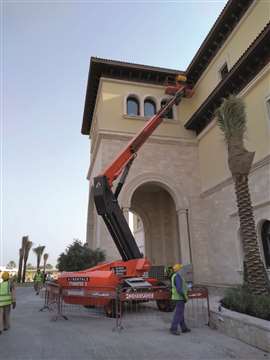 A Dingli on maintenance duties. A Dingli on maintenance duties.
On the subject of what is arguably the region’s most established MEWP market, the UAE, he comments, “Coming out of the pandemic, the UAE was a bit depressed in 2022 and into 2023. Like with the World Cup in Qatar, UAE and the Expo 2022, in Dubai,” says Ellis. “Then it was hit by the pandemic, and you’ve got to remember that Dubai relies on tourism – millions of people coming every year.” This led to a situation in 2023 with high competition, lower utilization and rental rates that were coming under increasing pressure. Remaining on the subject, Ellis says there is a much healthier outlook for 2024. “Things are looking up in the UAE and there are new projects being announced throughout the country.” Although, on the subject of rental rates, they are almost double in the KSA to what can be achieved in the UAE currently. One of the challenges in the UAE, compared to Saudi Arabia, is cash collection as it still remains an issue as a result of the pandemic, and can take anything from 120 to 150 days. Read Ellis’ views on the whole Middle East market at www.accessbriefing.com. |
Supporting documents
Click links below to download and view individual files.
STAY CONNECTED



Receive the information you need when you need it through our world-leading magazines, newsletters and daily briefings.
CONNECT WITH THE TEAM










